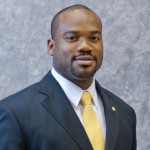A senator’s Scare begins

A 1947 propaganda comic book published by the Catechetical Guild Educational Society raising the spectre of a Communist takeover.
On February 9, 1950, Senator Joseph McCarthy launched his infamous anti-Communism crusade, announcing he had a list of 205 known communists working for the State Department at a speech in Wheeling, West Virginia.
“He had no names,” said James Marten, professor and chair of Marquette University’s history department. “He had nothing on the sheet of paper that he was waving around.”
While there was a legitimate fear and danger of Communism infiltrating the government, McCarthy, preying upon Americans’ anxiety, greatly exaggerated the threat in an attempt to secure his re-election in 1952, said Marten.
“He didn’t invent (the Red Scare), but he became the face of it,” said Marten. “It’s called McCarthyism for a reason. He’s not a likeable person. He’s not a good speaker. He’s not nice to look at. He’s very crude. He’s mean, but I think in some ways, people see that as a strength. If you’re fighting Communism in the government, you need to be tough.”
McCarthy’s mission continued for nearly four years with little Congressional obstruction, for fear of being seen as soft on Communism. While most of the country agreed with McCarthy’s pursuit of Communists, his methods and demeanor, along with a lack of evidence and failure to uncover a single Communist, eventually weakened the senator’s cause.
In March of 1954, the “Joe Must Go” movement in Wisconsin began a recall effort against McCarthy, but failed to collect the required signatures by the 60 day deadline due to inadequate organization and funding.
However, it was the broadcasting of the Army-McCarthy hearings in April of 1954 that led to McCarthy’s downfall, said Marten. The entire nation was exposed to McCarthy’s intimidation and bullying tactics in action.
“If there was a single straw, that was it,” said Marten. “That was the big blow-up that pointed out some hollowness to what he was doing.”
McCarthy’s floundering campaign came to a close by the end of the year when the Senate voted to condemn him for abusing his power as a senator.
“He cried wolf too many times,” said Marten. “People grew tired of him.”
This week in Wisconsin history: February 5-11
February 5, 1970: Milwaukee native James Lovell announces that his moon landing mission on Apollo 13 will be his last trip to space. Some speculate that Lovell, who had expressed an interest in running for the US Senate, may launch a political career once his space career ends. (Lovell ultimately never ran for office.)
February 7, 1867: Laura Ingalls Wilder is born in Pepin, Wisconsin. Her early years in the Wisconsin frontier inspired her to write her first children’s book, Little House in the Big Woods in 1932, the beginning of a nine-book series. The book was awarded the Lewis Carroll Shelf Award and a Newberry Honor.
February 7, 1937: Milwaukee is hit with an unusual winter storm that leaves 80 people injured. Dust, which had been carried from Oklahoma, combined with sleet and coated Milwaukee and other areas of the state with a dirty sheet of ice. In Milwaukee, the dusty sleet storm was followed by a thunderstorm with freezing rain and dense fog.
February 11, 2011: Governor Scott Walker introduces his controversial budget repair bill, sparking unprecedented protests and leading to the first gubernatorial recall election in Wisconsin’s history.


















In fall, 1954, a McCarthy ally in Indiana falsely and scandalously denounced George Marshall, formulator of the post-war Marshall Plan and President Dwight Eishenhower’s close friend and Secretary of State, as a “front man for traitors.” Campaigning at the time in support of local and congressional Republican candidates, Eisenhower gave a stump speech at the Milwaukee Arena, during which he had an opportunity but failed to defend Marshall or refute or distance himself from the slanderous accusation. The omission damaged their friendship and caused Eisenhower regret in later years.
Holly, this is great stuff. Many thanks. — Strini
Nice, succinct overview.